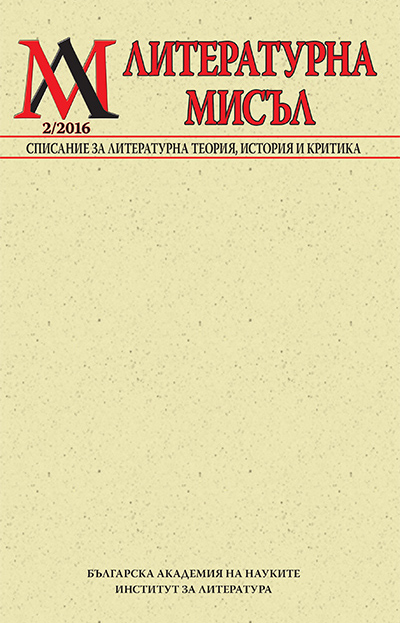Изкушенията на националните идентификации и литературознание на аргумента
The temptations of national identities and literary studies of the argument
Author(s): Raya KunchevaSubject(s): Language and Literature Studies, Studies of Literature, Theory of Literature
Published by: Институт за литература - БАН
Keywords: Lieux de mémoire; cultural heritage; Bogomilism
Summary/Abstract: Memory, heritage and identity are concepts that enjoy overuse and popularity very few other concepts do recently. At world, European and national level, they determine the framework of cultural policies and research projects.The name Cultural and Historical Heritage and National Identity was given to the field the institutes of the humanities work in during the reform of the Bulgarian Academy of Science in 2011. Thus, the Bulgarian Academy of Science is in unison with the contemporary situation, which many historians define as the age of heritage. How does science respond to the worldwide advance of cultural heritage? The concept “memory of places”, introduced by Pierre Nora, as well as the problems connected with the collective memory, have given an impetus to a series of concrete studies. Memory is selective, it mutates, it feeds myths and consolidates identities, and it builds differences. It is the historisation of memory that gives us the chance to show ideologically charged historical knowledge as deliberate construction of memory. Historians, sociologists and philosophers such as Pierre Nora, Anthony Smith, Benedict Anderson, Dominique Schnapper and Jürgen Habermas base this article on conceptions of the nation. The second part of the article studies the methodological contribution of Grażyna Szwat-Gyłybow to Bulgarian humanities with her view of Bogomilism as a place of memory. The definition of the West as the “significant other” in forming the national cultural consciousness of the Bulgarians is a serious refutation of the stereotypes in the way Bulgarian identity is thought of. Grażyna Szwat’s study shows that Bogomilism, the spirit of denunciation, the eternal heretic who never tolerates the power of institutions, is not an inherent Bulgarian trait, but a construct, which receives different meaning depending on what ideological suggestions are sought.
Journal: Литературна мисъл
- Issue Year: LIX/2016
- Issue No: 2
- Page Range: 12-34
- Page Count: 23
- Language: Bulgarian
- Content File-PDF

